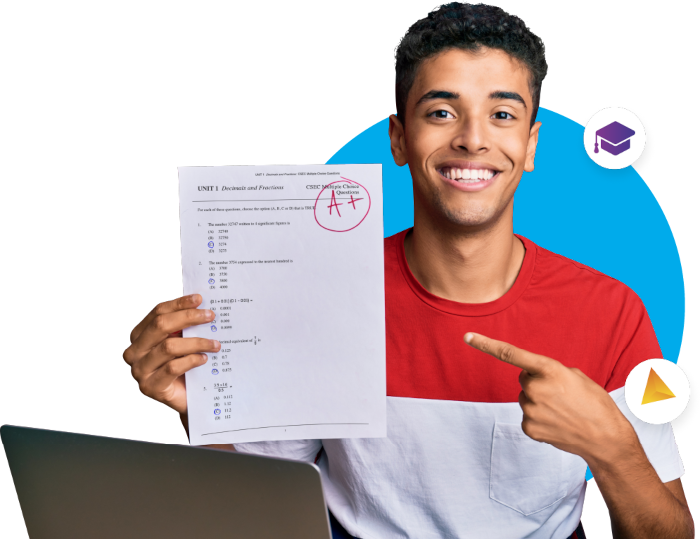Our premium, interactive, 1-on-1, academic math tutoring will equip your teen to turn their Pre-Calculus struggles into As and confidence.
Apply Now
Our premium, interactive, 1-on-1 academic math tutoring will equip your teen to turn their Pre-Calculus struggles into As and confidence.
Apply Now

Pre-Calculus introduction of new, technical topics.
Pre-Calculus is similar to Algebra 2 as there is a lot of overlap.However, Pre-Calculus is more technical, introducing many technical topics like DeMoivre’s theorem, vectors and matrices, rational factor theorem.
It also introduces a completely new type of graphs - polar graphs. It gives your child a deep dive into a new type of numbers - complex numbers. And a new way of describing movement and curves - with parametric equations.
Pre-Calculus can be challenging for students because of the technical aspect of it and the introduction of those several new concepts that are fundamentally different from what your child is used to.
Apply Now

Pre-Calculus introduction of new, technical topics.
Pre-Calculus is similar to Algebra 2 as there is a lot of overlap.However, Pre-Calculus is more technical, introducing many technical topics like DeMoivre’s theorem, vectors and matrices, rational factor theorem.
It also introduces a completely new type of graphs - polar graphs. It gives your child a deep dive into a new type of numbers - complex numbers. And a new way of describing movement and curves - with parametric equations.
Pre-Calculus can be challenging for students because of the technical aspect of it and the introduction of those several new concepts that are fundamentally different from what your child is used to.
Apply Now

Pre-Calculus is also often injected with elements of Calculus - often as an afterthought, over the last few weeks of the school year. Which is a big mistake because a quick dive into Calculus concepts over a few week period doesn’t really allow your child to gain a full understanding of it, and it doesn’t connect with Pre-Calculus topics at all.
The main challenges:
Apply Now
The main challenges:
- Precalculus is more technical than Algebra 2 even through there’s a lot of overlap.
- It contains several unique topics: polynomials that can’t be factorized with traditional methods, polar equations and graphs, parametric equations, matrices and vectors. All of these topics are very technical and challenging for most students.
- Pre-Calculus is often mixed with Calculus which is a big challenge since Pre-calculus, despite its name doesn’t prepare your child for Calculus in any meaningful way. Because of that, not only is Precalculus challenging because of the unique topics included in the curriculum but it also ends up “borrowing” the concepts from Calculus.
Apply Now


Pre-Calculus is also often injected with elements of Calculus - often as an afterthought, over the last few weeks of the school year. Which is a big mistake because a quick dive into Calculus concepts over a few week period doesn’t really allow your child to gain a full understanding of it, and it doesn’t connect with Pre-Calculus topics at all.
The main challenges:
Apply Now
The main challenges:
- Precalculus is more technical than Algebra 2 even through there’s a lot of overlap.
- It contains several unique topics: polynomials that can’t be factorized with traditional methods, polar equations and graphs, parametric equations, matrices and vectors. All of these topics are very technical and challenging for most students.
- Pre-Calculus is often mixed with Calculus which is a big challenge since Pre-calculus, despite its name doesn’t prepare your child for Calculus in any meaningful way. Because of that, not only is Precalculus challenging because of the unique topics included in the curriculum but it also ends up “borrowing” the concepts from Calculus.
Apply Now
Pre-Calculus Challenges
We Will Help Your Teen Overcome.
Pre-Calculus Challenges
We Will Help Your Teen Overcome.
Low retention of Algebra 1 concepts
Your child has taken Algebra 1 more than 12 months ago. Many students have difficulty retaining details of the material covered 5-6 months before (that's why the finals are difficult). As you might expect, by the time Algebra 2 rolls around, your child may not remember much of Algebra 1.Hence, many students need an extensive review. Algebra 2 includes all Algebra 1 foundations but with additional context, advanced concepts, methods and steps so struggling with Algebra 1 really holds a lot of students back.
Big homework-test gap
Many students feel that they understand the concepts when they are explained in class and are able to solve a lot (or all) homework problems. Yet, they struggle on tests.Some students are able to score 100% on homework and still fail tests.
How is that possible?
The problems on the tests tend to be more complicated, with extra steps, different wording or different twists.
Apply Now


Low retention of Algebra 1 concepts
Your child has taken Algebra 1 more than 12 months ago. Many students have difficulty retaining details of the material covered 5-6 months before (that's why the finals are difficult). As you might expect, by the time Algebra 2 rolls around, your child may not remember much of Algebra 1.Hence, many students need an extensive review. Algebra 2 includes all Algebra 1 foundations but with additional context, advanced concepts, methods and steps so struggling with Algebra 1 really holds a lot of students back.
Big homework-test gap
Many students feel that they understand the concepts when they are explained in class and are able to solve a lot (or all) homework problems. Yet, they struggle on tests.Some students are able to score 100% on homework and still fail tests.
How is that possible?
The problems on the tests tend to be more complicated, with extra steps, different wording or different twists.
Apply Now

Not enough covered in class
In your child’s class, the teacher likely shows 3-5 problems and hands out homework. I can say that with certainty because we see this over and over, with vast majority of students we talk to. It's prevalent.Showing 3-5 problems is not nearly enough.
Every topic in Algebra 2 has from 3 to 7 problem types. For every problem type, your child will have to deal with several different cases.
Hence, it’s pretty clear that your child’s teacher isn’t teaching nearly enough for your child to understand all of the problem types.
And yes, of course, your child should do homework and practice on their own. But they can’t do that without first having a solid fundamental understanding of the new material.
Passive learning
In class, in most cases, students don’t solve problems. They simply copy the solutions from the white board or fill out the notes sheet.That's called passive learning. And passive learning doesn't work. Instead of watching the teacher solve problems, reading the textbook or watching videos online, your child needs to actively analyze and solve problems.
Apply Now

Not enough covered in class
In your child’s class, the teacher likely shows 3-5 problems and hands out homework. I can say that with certainty because we see this over and over, with vast majority of students we talk to. It's prevalent.Showing 3-5 problems is not nearly enough.
Every topic in Algebra 2 has from 3 to 7 problem types. For every problem type, your child will have to deal with several different cases.
Hence, it’s pretty clear that your child’s teacher isn’t teaching nearly enough for your child to understand all of the problem types.
And yes, of course, your child should do homework and practice on their own. But they can’t do that without first having a solid fundamental understanding of the new material.
Passive learning
In class, in most cases, students don’t solve problems. They simply copy the solutions from the white board or fill out the notes sheet.That's called passive learning. And passive learning doesn't work. Instead of watching the teacher solve problems, reading the textbook or watching videos online, your child needs to actively analyze and solve problems.
Apply Now
Lack of individualized attention
The teachers sometimes aren’t able to answer questions. Sometimes they don’t want to. But even if they do, it’s very difficult with 20-30 students in the class. And since questions are the building blocks of learning, your child misses out on a lot of progress. To reach their full potential, they should learn at their own pace, ask questions about what's confusing to them, focus on the problems types they need to work on and learn in accordance with their learning preferences.Homework doesn't help
Many parents don’t know this but teachers often check the homework for completion, not correctness...Which means that your child gets 100% as long as they did the problems, regardless of whether they solved them correctly or not.
Yes, that explains why many students get 100% as their homework grade and still do poorly on tests.
Apply Now


Lack of individualized attention
The teachers sometimes aren’t able to answer questions. Sometimes they don’t want to. But even if they do, it’s very difficult with 20-30 students in the class. And since questions are the building blocks of learning, your child misses out on a lot of progress. To reach their full potential, they should learn at their own pace, ask questions about what's confusing to them, focus on the problems types they need to work on and learn in accordance with their learning preferences.Homework doesn't help
Many parents don’t know this but teachers often check the homework for completion, not correctness...Which means that your child gets 100% as long as they did the problems, regardless of whether they solved them correctly or not.
Yes, that explains why many students get 100% as their homework grade and still do poorly on tests.
Apply Now
Concepts covered
in Pre-Calculus
- Linear equations and inequalities
- Polynomials equations, inequalities and functions
- Rational equations, inequalities and functions
- Exponential and logarithmic functions and their applications
- Complex numbers
- Vectors
- Matrices
- Polar equations and graphs
- Parametric equations and word problems
- Conic sections
- Trigonometry and analytic trigonometry
- Sequences and series, induction
- Binomial theorem
- (Intro to Calculus) limits
- (Intro to Calculus) tangent lines and derivatives
These concepts are covered in different order depending on the school, class and even specific teacher.
The depth and difficulty level also depends on variety of factors. That’s why we always customize the approach to every student’s individual needs.

We develop a personalized learning plan to fit your child's math class and goals.
Apply Now
Apply Now

Concepts covered
in Pre-Calculus
- Linear equations and inequalities
- Polynomials equations, inequalities and functions
- Rational equations, inequalities and functions
- Exponential and logarithmic functions and their applications
- Complex numbers
- Vectors
- Matrices
- Polar equations and graphs
- Parametric equations and word problems
- Conic sections
- Trigonometry and analytic trigonometry
- Sequences and series, induction
- Binomial theorem
- (Intro to Calculus) limits
- (Intro to Calculus) tangent lines and derivatives
The depth and difficulty level also depends on variety of factors. That’s why we always customize the approach to every student’s individual needs.
We develop a personalized learning plan to fit your child's math class and goals.
Apply Now
Apply Now
Challenges students
experience on tests
“We didn’t do this in class.”
Sometimes the class runs short on time, there’s a sub or the teacher focuses on one of the problems, and there isn’t enough time to cover everything.When that happens, students often find themselves having to figure out the concepts, even the hardest ones, on their own.
“I kind of understand this problem but the wording throws me off.”
Teachers don’t cover many problems in class. As we mentioned, they usually show around 4-6 problems. Then, your child receives cookie-cutter homework.That creates a problem: during tests, students often encounter what we call "variations".
"Variations" are problems that often resemble the examples solved in class or in the homework but are different enough to be confusing. And students aren't sure how to approach them.
“These problems are way harder than homework.” Often times, the problems covered in class are easy to intermediate. There isn’t enough time to cover the hardest problems. But if your child is aiming for an A (or even a high B), they need to be able to solve all problems that show up on tests, especially the most challenging ones.
Challenges students
experience on tests
“We didn’t do this in class.”
Sometimes the class runs short on time, there’s a sub or the teacher focuses on one of the problems, and there isn’t enough time to cover everything.When that happens, students often find themselves having to figure out the concepts, even the hardest ones, on their own.
“I kind of understand this problem but the wording throws me off.”
Teachers don’t cover many problems in class. As we mentioned, they usually show around 4-6 problems. Then, your child receives cookie-cutter homework.That creates a problem: during tests, students often encounter what we call "variations".
"Variations" are problems that often resemble the examples solved in class or in the homework but are different enough to be confusing. And students aren't sure how to approach them.
“These problems are way harder than homework.” Often times, the problems covered in class are easy to intermediate. There isn’t enough time to cover the hardest problems. But if your child is aiming for an A (or even a high B), they need to be able to solve all problems that show up on tests, especially the most challenging ones.

Equip Your Teen To Excel In Pre-Calculus With Our Professional, Interactive, 1-on-1 Academic Math Tutoring.

